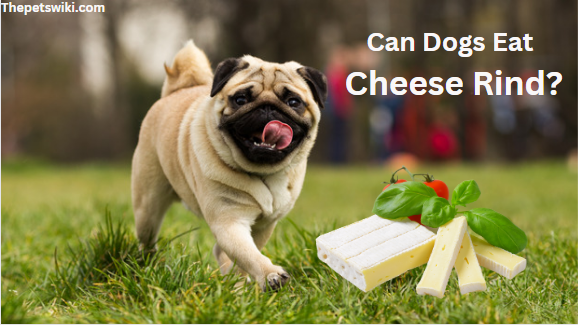If you’re wondering, “Can dogs eat cheese rind?” you’re not alone. As a seasoned veterinarian specializing in pet nutrition, I understand the importance of ensuring the best for our pets.
In my years of experience, I’ve encountered various dietary inquiries driven by genuine care for our beloved animals. Your concern about dogs consuming cheese rind reflects this dedication to responsible pet care. Now, let’s dive into whether cheese rind is safe for dogs. I’ll provide expert insights on the potential benefits and risks, guiding you toward informed decisions for your furry friend’s well-being.
What is Cheese Rind?
Cheese rind refers to the outer layer or covering that forms on certain types of cheese during aging. It develops naturally as the cheese matures and interacts with the surrounding environment. The appearance and characteristics of cheese rind can vary depending on factors such as the cheese variety, the type of milk used, and the aging conditions.
Cheese rind can range from thin and delicate to thick and robust, and it may exhibit different textures and colors. Some cheese rinds are edible and add flavor and complexity to the cheese, while others are not intended for consumption and are removed before eating.
Overall, cheese rind plays a role in protecting and preserving the cheese as it matures, and it can contribute to the overall sensory experience of enjoying cheese.
Can Dogs Eat Cheese Rind?
Yes, dogs can safely eat certain types of cheese rind, but it’s essential to exercise caution and select varieties that are safe for canine consumption. While some cheese rinds are edible and pose no harm to dogs, others may contain additives, mold, or other substances that could be harmful if ingested.
Suggested Reading: Can Dogs Have Provolone Cheese?
When offering cheese rinds to your dog, opt for natural and high-quality cheeses with edible rinds, such as certain types of aged cheddar or parmesan. Avoid cheeses with wax coatings, artificial additives, or moldy rinds, as these may cause digestive upset or other health issues for your dog.
How To Serve Cheese Rind To Dogs
When serving cheese rind to dogs, it’s essential to do so safely and appropriately. Here are some tips on how to serve cheese rind to dogs:
1. Choose Safe Varieties
Opt for natural and high-quality cheeses with edible rinds, such as aged cheddar or parmesan. Avoid cheeses with wax coatings, artificial additives, or moldy rinds, as these may be harmful to dogs.
2. Remove Any Inedible Parts
Before offering cheese rind to your dog, inspect it carefully and remove any inedible parts, such as wax coatings or moldy areas. Only offer the clean and edible portions of the cheese rind to your dog.
3. Cut Into Small Pieces
Cut the cheese rind into small, bite-sized pieces that are easy for your dog to chew and swallow. This can help prevent choking and ensure that your dog can safely consume the cheese rind.
Benefits Of Cheese Rind For Dogs
There are many healthy benefits of cheese rind for dogs as described below:
1. Nutritional Value:
- Cheese rind contains essential nutrients such as protein, calcium, and phosphorus, which are beneficial for your dog’s overall health.
- These nutrients support muscle development, bone health, and overall vitality in dogs.
2. Dental Health:
- Chewing on cheese rind can help scrape away plaque and tartar from your dog’s teeth, promoting dental health and reducing the risk of periodontal disease.
- The texture of cheese rind can also stimulate saliva production, which helps cleanse the mouth and maintain oral hygiene.
3. Mental Stimulation:
- Offering cheese rind to your dog as a treat provides mental stimulation and enrichment, as it gives them something novel and engaging to chew on.
- This can be particularly beneficial for dogs who enjoy chewing and need an outlet for their natural behaviors.
4. Source of Enrichment:
- Cheese rind can serve as a source of enrichment for dogs, offering them a different texture and flavor compared to their regular diet.
- Enrichment activities like chewing on cheese rind can help prevent boredom and provide mental stimulation for dogs, leading to a happier and healthier pet.
5. Digestive Health:
- In moderation, cheese rind can contribute to your dog’s digestive health by providing dietary fiber that supports regular bowel movements.
- The probiotics present in cheese rind can also promote a healthy gut microbiome, aiding in digestion and nutrient absorption.
Potential Risks Of Cheese Rind For Dogs
With health benefits there are also some risks involved in feeding cheese rind to dogs:
1. Digestive Upset:
- Cheese rind may be difficult for some dogs to digest, leading to symptoms such as diarrhea, vomiting, or abdominal discomfort.
- The rich and fatty nature of cheese rind can overwhelm sensitive stomachs, causing digestive upset in dogs, especially if consumed in large quantities.
2. Choking Hazard:
- Some cheese rinds can be tough or hard, posing a choking hazard for dogs, particularly smaller breeds or those prone to gulping their food.
- If dogs swallow large pieces of cheese rind without properly chewing, it may become lodged in their throat or esophagus, leading to choking or breathing difficulties.
3. Allergic Reactions:
- Dogs may be allergic or sensitive to certain ingredients present in cheese rind, such as mold, additives, or preservatives.
- Allergic reactions can manifest as itching, hives, swelling, or gastrointestinal symptoms, indicating an adverse response to the cheese rind.
4. High Salt Content:
- Some types of cheese rind may contain high levels of salt, which can be harmful to dogs if ingested in excess.
- Excessive salt intake can lead to dehydration, electrolyte imbalances, and even sodium toxicity, posing a risk to your dog’s health and well-being.
5. Mold Contamination:
- Cheese rind is susceptible to mold growth, especially if improperly stored or past its expiration date.
- Ingesting moldy cheese rind can lead to gastrointestinal issues and mycotoxin poisoning in dogs, causing symptoms such as vomiting, diarrhea, and lethargy.
6. Weight Gain:
- Cheese rind is calorie-dense and high in fat, which can contribute to weight gain and obesity in dogs if consumed in large quantities.
- Excessive intake of cheese rind as a treat can lead to an imbalance in your dog’s diet, increasing their risk of obesity-related health issues such as diabetes, joint problems, and cardiovascular disease.
7. Dental Problems:
- While chewing on cheese rind may help promote dental health in some dogs, it can also pose a risk of dental problems.
- Hard or sharp cheese rinds may cause damage to your dog’s teeth or gums, leading to tooth fractures, gum injuries, or oral infections.
8. Pancreatitis:
- The high-fat content of cheese rind can exacerbate or trigger pancreatitis, a painful and potentially life-threatening inflammation of the pancreas in dogs.
- Dogs with a history of pancreatitis or those prone to digestive issues should avoid consuming cheese rind to prevent the onset of pancreatitis episodes.
Cheese Rind Alternatives For Dogs
Finding suitable alternatives to cheese rind for dogs can provide variety and ensure their safety and well-being. Here are some alternatives to consider:
1. Carrot Sticks:
- Carrot sticks are low in calories and high in fiber, making them a healthy and crunchy alternative to cheese rind.
- They are rich in vitamins and minerals, such as vitamin A and potassium, which support overall health and digestion in dogs.
2. Apple Slices:
- Apple slices are a sweet and nutritious alternative to cheese rind, providing dogs with vitamins, antioxidants, and dietary fiber.
- Remove the seeds and core before offering apple slices to dogs to prevent choking hazards and cyanide exposure.
3. Sweet Potato Chews:
- Sweet potato chews are natural, low-fat treats that offer dogs a satisfying chew and are gentle on the digestive system.
- They are rich in vitamins, minerals, and antioxidants, promoting gut health and supporting immune function in dogs.
4. Green Beans:
- Green beans are a crunchy and low-calorie alternative to cheese rind, providing dogs with essential nutrients like fiber, vitamins, and minerals.
- They can be served raw, steamed, or lightly cooked as a healthy snack or added to your dog’s meals for extra fiber and nutrients.
5. Blueberries:
- Blueberries are small, bite-sized fruits that are rich in antioxidants, vitamins, and fiber, making them a nutritious and flavorful alternative to cheese rind.
- They can be offered fresh or frozen as a refreshing treat for dogs, promoting overall health and well-being.
6. Pumpkin Cubes:
- Pumpkin cubes are low in calories and high in fiber, making them a beneficial alternative to cheese rinds for dogs with sensitive stomachs or weight management goals.
- They are also a good source of vitamins, minerals, and antioxidants, supporting digestive health and immune function in dogs.
7. Plain Rice Cakes:
- Plain rice cakes are low in calories and easy to digest, making them a light and crunchy alternative to cheese rind for dogs.
- They can be served plain or topped with a small amount of peanut butter or mashed banana for added flavor and nutrition.
8. Freeze-Dried Meat Treats:
- Freeze-dried meat treats, such as chicken, beef, or fish, are protein-rich alternatives to cheese rind that appeal to dogs’ natural carnivorous instincts.
- They are minimally processed and free from additives, providing dogs with a nutritious and flavorful snack option.
Conclusion
In conclusion, while cheese rind can be a tasty and enjoyable treat for some dogs, it’s essential to consider the potential risks and alternatives to ensure your furry friend’s safety and well-being. While some dogs may tolerate cheese rind well and benefit from its nutritional value, others may experience digestive upset, allergic reactions, or other health issues. Therefore, it’s crucial to offer cheese rind in moderation and monitor your dog for any adverse reactions. Ultimately, by making informed decisions and prioritizing your dog’s health and dietary needs, you can ensure that they enjoy a balanced and fulfilling diet while indulging in occasional treats like cheese rind.
Related Articles
Can Dogs Eat Babybel Cheese? [Safe or Risky]
Can Dogs Eat Ricotta Cheese? Is it Risky or Safe?


